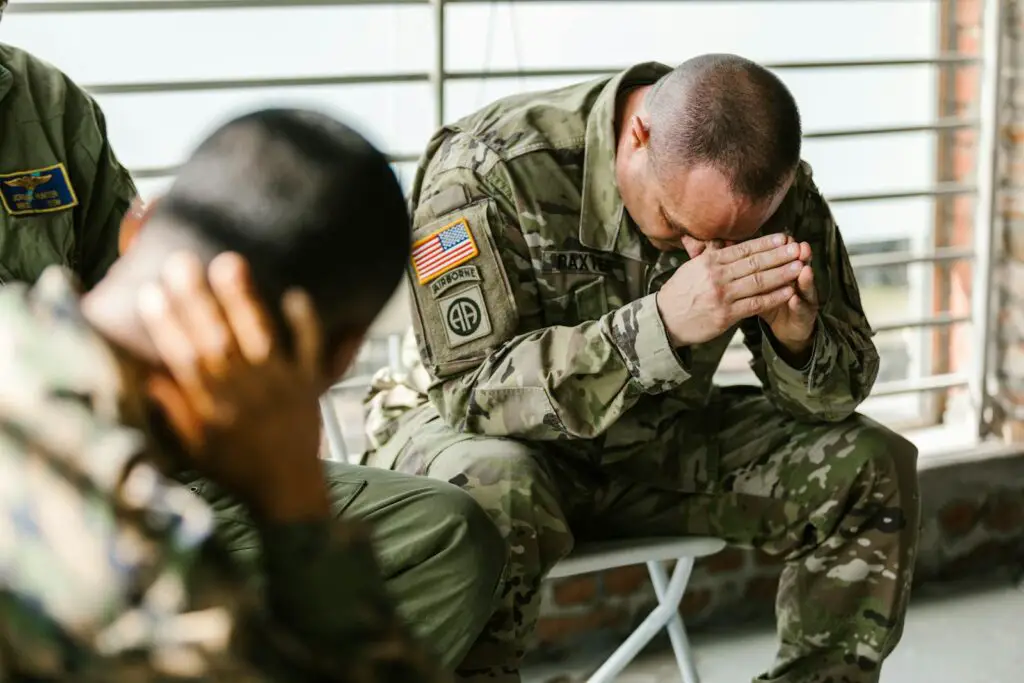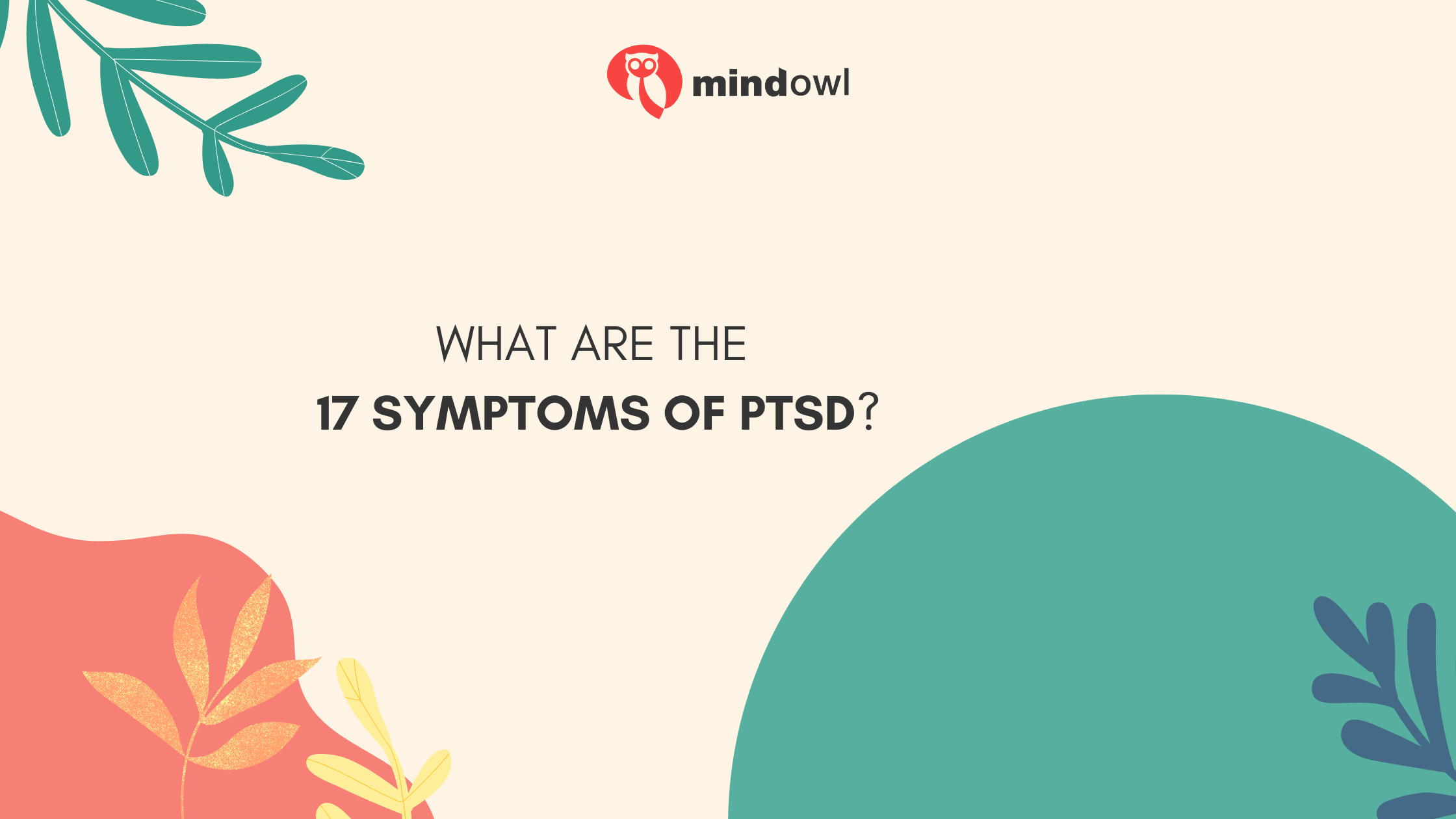Post-Traumatic Stress Disorder (PTSD) is a complex mental health condition triggered by experiencing or witnessing a traumatic event. The symptoms are varied and can deeply affect an individual’s daily life. Here’s an in-depth look at the 17 symptoms of PTSD:
17 Common Symptoms of PTSD
1. Intrusive Thoughts
Intrusive thoughts are among the most recognized symptoms of PTSD. These unwanted, distressing memories can appear suddenly, disrupting daily activities. For instance, someone who survived a car accident might feel panicked when in a vehicle, or these thoughts might occur randomly without any apparent trigger.
2. Nightmares
Many trauma survivors experience recurring nightmares. According to research by the U.S. Department of Veterans Affairs, 71% of individuals with PTSD report having nightmares, which can be more frequent if they have other mental health issues.
3. Avoiding Reminders of the Event
Avoidance is a major coping mechanism for PTSD. People often steer clear of situations, activities, or places that remind them of the traumatic event. For example, a person who nearly drowned may avoid swimming, baths, or beaches to prevent triggering distressing memories.
4. Insomnia
Sleep disturbances, including insomnia, are common in PTSD. Hypervigilance makes it hard to relax and fall asleep. Additionally, the fear of nightmares can deter individuals from wanting to sleep, sometimes leading to substance use as a coping mechanism.
5. Vivid Flashbacks
Flashbacks are intense and vivid recollections of the traumatic event, making it feel like it’s happening again. Triggers such as specific scents or sounds can provoke these flashbacks, causing panic and aggressive responses. Grounding techniques can help manage these episodes.
6. Avoiding People, Places, and Things Related to the Event
To prevent flashbacks, individuals with PTSD might avoid anything that reminds them of the trauma, which can lead to social withdrawal. While avoidance may seem like a solution, it often exacerbates symptoms over time.
7. Memory Loss
PTSD can affect memory, not necessarily due to a physical brain injury but as a defense mechanism. The hippocampus, amygdala, and prefrontal cortex play key roles in stress and memory. Traumatic experiences can disrupt these areas, leading to memory loss, which might resurface unexpectedly, causing significant distress.
8. Hypervigilance
After trauma, people may become hypervigilant, staying constantly alert to potential dangers. This heightened state of awareness can be exhausting and distressing, significantly impacting daily life.
9. Negative Thoughts About Self and the World
Trauma alters one’s worldview and self-perception. Individuals with PTSD often feel hopeless and view themselves negatively. They might struggle to envision a future or see themselves achieving life milestones. Therapy can help rebuild self-esteem and foster a positive outlook.
10. Self-Isolation and Feeling Distant
Connecting with others can be challenging for those with PTSD. They may withdraw from social interactions to avoid potential triggers or because they feel disconnected from others who haven’t shared their experiences. Professional therapy can help bridge this gap.
11. Anger and Irritability
Hyperarousal from PTSD often manifests as anger and irritability. The brain remains in a heightened state of “fight or flight,” causing individuals to react aggressively or feel irritable even without clear reasons.
12. Reduced Interest in Favorite Activities
PTSD can drain the joy from activities once enjoyed. Mood changes, insomnia, and avoidance behaviors contribute to a lack of motivation and interest in hobbies and work.
13. Difficulty Concentrating
The anxiety and hyperarousal associated with PTSD can make concentration difficult. Those affected might struggle to focus on tasks at work, school, or home, as their minds frequently wander.
14. Casting Blame
Self-blame is common after trauma. Individuals might blame themselves or others for what happened. For example, someone involved in a boating accident might blame the driver or themselves for not preventing the incident.
15. Difficulty Feeling Positive Emotions
PTSD can dampen the ability to feel positive emotions. Anger, sadness, and guilt are prevalent, but individuals might also find it hard to enjoy good moments or control their responses to positive experiences.
16. Exaggerated Startle Response
A heightened startle response is a hallmark of hypervigilance in PTSD. Trauma survivors may react strongly to unexpected noises or movements, feeling constantly on edge.
17. Risky Behaviors
Engaging in risky behaviors is a common symptom of PTSD. Trauma survivors, including those with a history of adverse childhood experiences or combat veterans, may turn to substance abuse, unsafe sex, or high-adrenaline activities as coping mechanisms. Professional treatment is crucial for those engaging in such behaviors.
Understanding these symptoms is essential for recognizing and addressing PTSD. Professional treatment, including therapy and support groups, can significantly aid in managing and alleviating these symptoms.

What Causes PTSD?
There is no official list of events that can cause PTSD, because it can really be caused by anything that a person deems as traumatic. However, below are a few of the most common types of events that can cause long-term trauma.
Violence
Violence is a very broad category that encompasses a wide variety of possible events. Combat exposure, sexual assault, domestic violence, and a terrorist attack are all events that could cause PTSD. Childhood abuse or neglect, whether or not it is physically violent, can also cause long-term trauma.
Serious Accidents or Injuries
Experiencing serious accidents or injuries can be extremely traumatic. This includes car accidents, major surgeries, or life-threatening illnesses such as cancer. The sudden and often violent nature of these incidents can leave lasting psychological scars. Survivors may struggle with flashbacks, anxiety, and a pervasive sense of vulnerability long after the physical wounds have healed. It is possible to recover compensation for your PTSD treatment through a personal injury claim.
Natural Disasters
Natural disasters such as tornadoes, hurricanes, floods, and earthquakes can cause significant trauma. These events often involve sudden and overwhelming destruction, loss of property, and, in many cases, loss of life. The chaos and fear experienced during such disasters can lead to long-term emotional distress and PTSD.
Losing a Loved One
Losing a loved one, especially suddenly, can be a profound and devastating experience. The shock and grief associated with unexpected deaths can be overwhelming, leading to PTSD. This type of loss can shatter one’s sense of normalcy and security, causing persistent emotional pain and difficulty coping with everyday life.
Understanding these common causes and symptoms of PTSD is essential for recognizing the diverse and personal nature of traumatic experiences. Each individual’s response to trauma is unique, and what might be traumatic for one person may not affect another in the same way. Recognizing and validating these experiences is a crucial step in providing the necessary support and treatment for those suffering from PTSD.
MindOwl Founder – My own struggles in life have led me to this path of understanding the human condition. I graduated with a bachelor’s degree in philosophy before completing a master’s degree in psychology at Regent’s University London. I then completed a postgraduate diploma in philosophical counselling before being trained in ACT (Acceptance and commitment therapy).
I’ve spent the last eight years studying the encounter of meditative practices with modern psychology.

